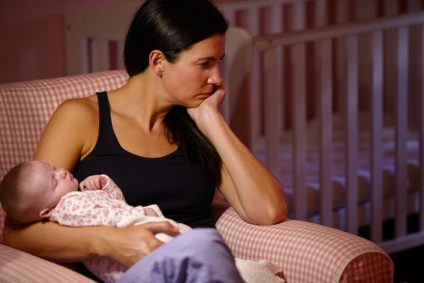
Who knew?
It turns out that vaginal birth has risks and the suffering doesn’t end when the baby is delivered.
Among the typical symptoms women face in the first week after childbirth: heavy bleeding, abdominal cramping, constipation, hemorrhoids, chills, night sweats, difficulty going to the bathroom, engorged breasts, back pain, headaches. And it goes on: pain in the perineum (the diamond shaped sling of muscles in the pelvis), incision pain (if the woman has had a C-section), pain and difficulty walking (after an episiotomy or tear), depression, anxiety, and exhaustion.
The pain can last for weeks:
[pullquote align=”right” cite=”” link=”” color=”” class=”” size=””]They demonize the one procedure that can protect the pelvic floor and recommend the one that is most likely to destroy it.[/pullquote]
About half of women who give birth are still in pain weeks later. More than 40 percent of women who delivered vaginally reported perineal pain, and nearly 60 percent who had C-sections experienced incision pain within two months of childbirth … Nearly 80 percent of mothers surveyed said pain interfered with their daily activities. One in three reported urinary or bowel problems.
Why is this happening? It’s doctors’ fault!
OB-GYNs and midwives who deliver babies don’t often find postpartum problems like nerve damage and incontinence because they aren’t looking for them. As Kari Bø, pelvic floor expert at the Norwegian School of Sports Science, explains, “Gynecologists, urologists and colorectal surgeons concentrate on their areas of interest and tend to ignore the pelvic floor common to them all.”
Rather than focusing on the “three holes in the pelvis,” practitioners owe it to women to see the “whole pelvis.” Since they don’t, pelvic pain or dysfunction often goes overlooked. Nearly a quarter of women have a pelvic floor disorder. The prevalence increases with each child a woman has.
And that is pure unadulterated bullshit!
A substantial portion of gynecologic practice involves dealing with the consequences of childbirth injuries including uterine prolapse, cystocele, rectocele, urinary incontinence, fecal incontinence and fistula. Indeed there is an entire sub-specialty, urogynecology, that is devoted to nothing else.
What is a urogynecologist?
Urogynecologists are physicians who complete medical school and a residency in Obstetrics and Gynecology or Urology. These physicians are specialists with additional years of fellowship training and certification in Female Pelvic Medicine and Reconstructive Surgery. The training provides expertise in the evaluation, diagnosis, and treatment of conditions that affect the muscles and connective tissue of the female pelvic organs…
What do they treat?
Urinary incontinence: Loss of bladder control …
Interstitial cystitis and bladder pain syndromes: Discomfort related to the bladder and/or urethra
Pelvic organ prolapse: Dropping of the pelvic organs (bladder, bowel, retum, uterus, vagina)
Fecal incontinence/Accidental bowel leakage: Loss of bowel control
Urogynecologic fistula: Abnormal hole between the bladder and the vagina (vesicovaginal), the urethra and the vagina (urethrovaginal), or the rectum and the vagina (rectovaginal) …
Yarrow’s insistence that doctors don’t know anything has become something of a cottage industry for her.
The day after this nonsensical piece claiming that doctors are ignorant of pelvic floor injuries she had a different piece in The Washington Post entitled Why do we understand so little about breast-feeding?. The subtitle of the piece is “Despite the emphasis on breast-feeding, the medical establishment can offer little help to nursing moms.” That’s not true, either.
It is Yarrow who is ignorant, not doctors and her ignorance reflects the know-nothingism of the natural childbirth industry. It’s an industry based on the premise that if it is natural, it must be good. And now it is shocked to discover that natural can be very bad indeed.
Doctors have known this for millennia. Consider the episiotomy. It is anathema within the natural childbirth industry, which utterly ignores its purpose. The episiotomy was designed to protect the pelvic floor. It turns out that it didn’t work the way it was intended (it made the most serious perineal injuries more likely not less) but it reflects both the fact that obstetricians understood that childbirth led to serious pelvic floor disorders and the hope that they could be prevented.
We do know a way to mitigate pelvic floor disorders; a C-section protects the pelvic floor from the ravages of childbirth, but C-sections are anathema, too. How dare a woman have the choice of an elective C-section to protect her pelvic floor?
What’s the biggest risk factor for pelvic disorders? Obstetric forceps. That’s not surprising when you consider that it is the baby’s head that causes pelvic damage; the bigger the head, the greater the damage. Forceps, basically giant metal salad tongs, effective increase the diameter of the baby’s head while simultaneously increasing the forces on the pelvic tissues by adding the doctor’s pulling force.
Yes, a C-section is major abdominal surgery, but it is generally easy and can be accomplished in 30 minutes or less. In contrast, I’ve seen massive vaginal injuries that were caused by forceps that required multiple hours and hundreds of stitches to close. That’s one of the reasons why I never used forceps.
In the absurd moral panic around C-sections, natural childbirth advocates have promoted forceps deliveries as a way to avoid C-sections. They demonize the one procedure that can protect the pelvic floor and, in its place, recommend the one procedure that is most likely to destroy it. Does that make any sense at all?
Vaginal birth has serious risks and can lead to significant, debilitating, lifelong injuries. Doctors have always known this and tried to prevent it. Now the natural childbirth industry is shocked to discover that fact and instead of taking responsibility for their dangerous beliefs they’ve done what they always do. They reflexively blame doctors, the very people who were warning them of the risks all along.

